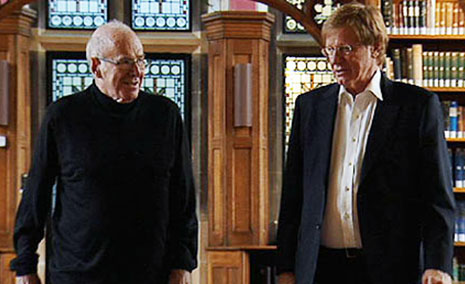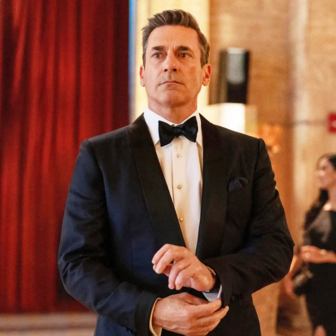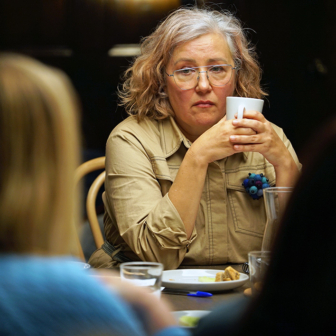CLIVE JAMES always seemed to me to have the robust physique of a once mighty front-row forward: balding and barrel-chested, but with a slightly tottering, tippy-toe way of walking. Yet here he was being escorted protectively through the grounds of his old Cambridge College by the ABC’s gun interviewer Kerry O’Brien and he looked withered, shrunken and breathless – all too like the man who had written in a recent poem: “My watch-band feels too loose around my wrist.”
James is, of course, one of the Golden Expats. Like Germaine Greer and Barry Humphries and the late Robert Hughes he escaped Australia when it was a smaller and smaller-minded nation and made a name for himself in the Great World; first, as a brilliant literary journalist and witty TV critic; later, as a TV performer and bemused purveyor of Japanese game shows.
James was hungry for knowledge and even hungrier for fame. By being both a showman and a scholarly recluse, he rose above the ruck. He wrote jokes – and essays about the philosophy of jokes. And we Australians loved him for it. He achieved what we hope for our cricketers and rugby players: he beat the Poms at their own game, on their own turf.
And now the seventy-three-year-old polymath and entertainer is dying; of leukaemia and emphysema. He can’t stray too far from his local hospital. He can’t travel anymore. He will never see Sydney again.
We’re all dying, I suppose, but James’s doctors have given him a timetable. And Kogarah’s favourite son can hear the brakes moan, and feel the carriage shudder. “I’m a man,” he said not very long ago, “who is approaching his terminus.”
So when he sat down opposite Kerry O’Brien in the library of Pembroke College to deliver what might be his final performance for the “folks back home,” this knowledge hung in the air like the smoke from one of the cigarettes he used to love so much.
But Clive was quick to clear the pall. He was brave, he was serious and he was, as ever, seriously funny. Asked about his decision to try his luck in London, he assured O’Brien that “lemmings have a better plan than I had.”
James told of his mother widowed by the war and the day the telegram arrived that changed both their lives. He told of his absent father and how he burst into stinging middle-aged tears at his grave in Singapore. He got to reprise some of his best lines and relive the famous billycart catastrophe of his boyhood, which saw Mrs Braithwaite’s prized bed of poppies brutally decapitated all those years ago in suburban Sydney. He told of his days on the other side of TV encounters, when he was always scared of asking the questions his guests didn’t want to answer. He told of the time he flattered a wary Katharine Hepburn into talking about her former lover Howard Hughes by remarking sweetly that falling for her must have been the only sane thing he ever did.
O’Brien brought all this out with great skill and genuine warmth. But his decision to talk so much about James’s poetry was a strategic masterstroke. It was the Hepburn Manoeuvre turned against its inventor because it got Clive talking about the only subject that he didn’t want to discuss: the state of his forty-five year marriage to Prue Shaw, an Australian-born Cambridge don and Dante scholar. Outed last year as having conducted a long affair with a woman thirty years his junior, James was banished from the family home in the midst of his health problems.
Over the years James has assiduously protected his family from the glare he so happily lives in, but he couldn’t deny the truthfulness of his own poetry.
Think less of love and all that you have lost.
You have no future so forget the past.
Let this be no occasion for despair.
Cherish the prison of your waning day.
Remember liberty, and what it cost.
O’Brien had bowled up a cunning in-swinger. Caught heart before wicket, James had to open up, if only just a little. He admitted to selfishness and a cold heart, to oftentimes placing his career and personal pleasures above those of his family, to not being emotionally engaged enough when it mattered. All these late poems, O’Brien realised, are really just a single heartfelt cry: I was a fool. Please forgive me. Have me back.
Many years ago the British TV playwright Dennis Potter spoke to Melvyn Bragg after being diagnosed with pancreatic cancer. Swigging from a flask of morphine, the author of The Singing Detective had just months to live, but according to him he had never felt so alive and purposeful. It was electrifying television, probably the greatest interview I’ve ever witnessed. The Kid from Kogarah might not have reached those heights, but it came pretty damn close. •




